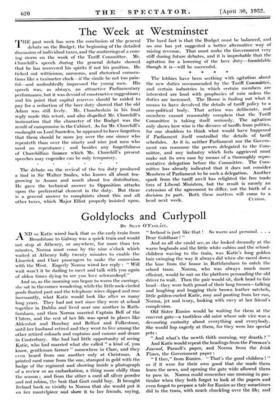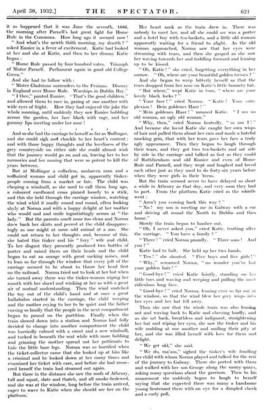Goldylocks and Curlypoll
By SEAN
OTAOLRIN.
AND so Katie wired back that as the early train from Broadstone to Galway was a quick train and would. not stop at Athenry, or anywhere, for more than ten minutes, Norma must come by the nine o'clock which waited at Athenry fully twenty minutes to enable the- Limerick and Clare passengers to make the connexion- With the West. Eagerly Norma wired her reply : " Will wait won't it be darling to meet and talk with you again of olden times dying. to see you love schwarzkopf."
And so, as the morning sun began to warm the carriage, she sat in the corner wondering, while the little rock-circled pools floated past and the telephone wires dipped and rose incessantly, what Katie would look like after so many long years. They had not met since they were at school together in Dublin and lived near one another in Rath- famham, and then Norma Married Captain Bell of the Ulsters, and the rest of her life was spent in places like Aldershot and Bombay and Belfast and Folkestone, until her husband retired and they went to live among the other retired colonels and captains and canons and deans in Canterbury. She had had little opportunity of seeing Katie, who had married what she called " a kind of, you know, gentleman farmer " somewhere in Clare, and they even heard from one another only at Christmas. A printed card came from the one, stamped in gold with the badge of the regiment and showing inside a photograph of a review or an embarkation, a thing more chilly .than the season; and from the other, a card all silver powder and red robins, the best that Gott could buy. It brought Ireland back so vividly to Norma that she would put it on her mantelpiece and show it to her friends, saying, ,
" Ireland is just like that ! So warm and personal. . . Dear Goldhaar ! "
And so all she could see, as she looked dreamily at the warm boglands and the little white cabins and the school- children waving to the train, was Katie's long golden hair swinging the way it always did when she raced down the lane from the house in Hathfarnham to catch the school tram. Norma, who was always much more efficient, would be out on the platform persuading the old driver to wait. Then the pair would sit, dark head to fair head—they were both proud of their long tresses—talking. and laughing and hugging their brown leather satchels, little golden-curled Katie, rosy and panting from her run, Norma, jet and ivory, looking with envy at her friend's complexion.
Old Sister Eunice would be waiting for them at the convent gate—a toothless old saint whose sole vice was a devouring curiosity about everything and everybody. She would lisp eagerly at them, for they were her special pets : " And what's the newth thith morning, my dearth.? "
And Katie would repeat the headings from the Freeman's Journal, Parnell's paper, and Norma from the Irish Times, the Government paper : " I thee," from Eunice. " That's the good children ! " as if it were for their own good that she made them learn the news, and opening the gate wide allowed them to pasS M. Norma could remember one morning in par- ticular when they both forgot to look at the papers and . even forgot to prepare. a tale for Eunice as they sometimes did in the tram, with much chuckling over the fib; and.
it so happened that it was June the seventh, 1886. the morning after Parnell's last great fight for Home Rule in the Commons. How long ago it seemed now !
" And what's the newth thith morning, my dearth ? " asked Eunice in a -fever of excitement. Katie had looked at her and she at Katie, and then to her dismay Katie began : • • " Home Rule passed by four hundred votes. Triumph of Mister Parnell. Parliament again in good old College Green." .
And she had to follow with :
" Mister Gladstone surrenders to the Fenians. Dismay in England over Home Rule. Warships in Dublin Bay.-
" I thee," panted Eunice. "That's the good children," and allowed them to race in, gazing at one another with wide eyes of fright. How they had enjoyed the joke the whole morning, until suddenly they saw Eunice hobbling across the garden, her face black with rage, and her gummy lips Meeting under her nose !
And so she had the carriage to herself as far as Mullingar, and she could sigh and chuckle to her heart's content ; and with those happy thoughts and the loveliness of the grey countryside on either side she could almost wish that the journey would go on and on, leaving her to her memories and her musing that were so potent to kill the years between.
But at Mullingar a collarless, unshaven man and a redhaired woman and child got in, apparently tinker- people coming frOm a market or• fair. The child was clasping a- windmill, as she used to call them long ago, a coloured cardboard cross pinned loosely to a stick, and this she held through the carriage window, watching the wind whirl it madly round and round, often looking shyly at Norma and with a happy delight at her mother who would nod and smile ingratiatingly across at " the lady." But the parents smelt none too clean and Norma drew back her skirts and peered at the child disapprov- ingly as one might at some odd animal at a zoo. She could not return to her thoughts and, because of this. she hated this tinker and his " foxy " wife and child. To her disgust they presently produced two bottles of porter and raised them on their heads and the child began to eat an orange with great sucking noises, and to lean so far through the window that every jolt of the carriage seemed to be about to throw her head first on the railroad. Norma tried not to look at her but when she turned away there was the tinker-woman wiping her mouth with her shawl and winking at her as with a great air of mutual understanding. Then the wind snatched the toy out of the child's hand and at once a great hullabaloo started in the carriage, the child weeping and the mother crying to her to be quiet and the father cursing so loudly that the people in the next compartment began to pound on the partition. Finally when the train slowed down into a station and Norma had fully decided to change into another compartment the child was hurriedly calmed with a sweet and a new windmill, and tucked in beneath the seat while with more bobbing and grinning the mother spread out her petticoats to hide the little bare legs. Norma was so horrified when the ticket-collector came that she looked up at him like a criminal and be looked down at her many times and examined her-ticket with care, and before she had recov- ered herself the train had steamed out again.
But there in the distance she saw the roofs of Athenry, tall and squat; slate and thatch, and all smoke-bedewed, and she was at the window, long before the train arrived, eager to wave to Katie when she should see her on the - platform:-
Her heart sank as the train drew in. There was nobody to meet her, and all she could see was a porter and a hotel boy with tea-baskets, and a little old woman apparently waiting for a friend to alight. As the old woman approached, Norma saw that her eyes were streaming with tears, and then she gasped as she saw her waving towards her and toddling forward and leaning up to be kissed.
" Oh, Katie ! " she cried, forgetting everything in her sorrow. " Oh, where are your beautiful golden tresses ?
And she began to weep bitterly herself so that the tears dropped from her nose on Katie's little bonnety hat.
" But where," wept Katie in turn, " where are your lovely black locks ? "
" Your face ! " cried Norma. " Katie ! Your eon,- plexion ! Dein goldenes Haar ! "
" Mein goldenes Haar ! " moaned Katie. " I am an old woman, an ugly old woman."
" Why, then," cried Norma heatedly, " so am I ! And because she loved Katie she caught her own wisps of hair and pulled them .about her ears and made a hateful mocking grin, that with her tears gave her face a truly ugly appearance. Then they began to laugh through their tears, and they got two tea-baskets and sat side by side in the carriage and talked as fast as they could of Rathfarnham and old Eunice and even of Home Rule and Parnell, and they wept and laughed and loved each other just as they used to do forty-six years before when they were girls in their 'teens.
But the train seemed never to have delayed so short. a while in Athenry as that day, and very soon they. had to part. From the platform Katie cried as the whistle went : " Aren't you coming back this way ? "
" No ! my son is meeting me in Galway with a ear and driving all round the North to Dublin and then home." • Slowly the train began to lumber out.
" Oh, •I never asked you," cried Katie, trotting after the carriage. " You have a family ? "
" Three ! " cried Norma proudly. " Three sons ! And you ? "
Katie had to halt. She held up her two hands.
" Ten ! " she shouted. " Five boys and five girls ! " " Why," screamed Norma, " no wonder you've lost your golden hair ! "
" Good-bye ! " cried Katie faintly, standing on her little toes and waving and weeping and pulling I he most ridiculous long face.
" Good-bye ! " cried Norma, leaning ever so far out of the window, so that the wind blew her grey wisps into her eyes and her hat fell awry.
Then she saw that the whole train was also leaning out and waving hack to Katie and cheering loudly, and as she sat back, breathless and indignant, straightening her hat- and wiping her eyes, she saw the tinker and his wife nodding at one another and smiling their pity at her, and she was filled herself with love for them and delight.
" We get old," she said.
"We do, ma'am," sighed the tinker's wife fondling her child with whom Norma played and talked for the rest of the journey to Galway. There she parted with them and walked with her son George along the sunny quays, asking many questions about the garrison. Then to his amazement • she suddenly began to laugh to herself saying that she expected there was many a handsome young lieutenant-there with an eye for a dimpled cheek and a curly poll.







































 Previous page
Previous page